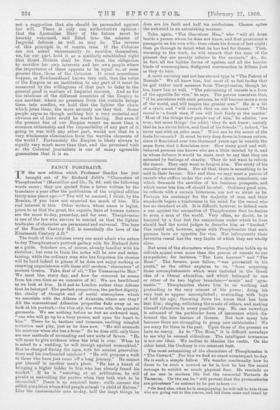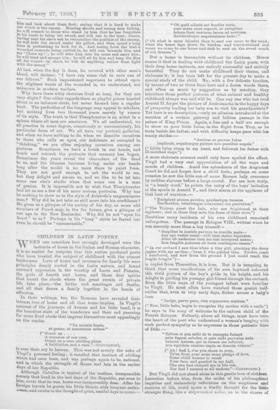FANCY PORTRAITS.
IN the new edition which Professor Sandys has just brought out of Sir Richard Jebb's "Characters of Theophrastus " (Macmillan and Co., 7s. 6d. net) the following words occur; they are quoted from a letter written by the translator a year after the publication of the original edition thirty-nine years ago :—" You will be amused, I think, by the Eresian, if you have not expected too much of him. His real interest is this. Other writers, whose name is legion, prove to us that the great, the organic, lines of human nature are the same to-day, yesterday, and for ever. Theophrastus is one of the few who survive to remind us that the lighter traits also of character are permanent and universal. The bore of the Fourth Century B.C. is essentially the bore of the Nineteenth Century A.D."
The truth of this criticism every one must admit who enters to-day Theophrastus's portrait gallery with Sir Richard Jebb as a guide. Scholars are, of course, already familiar with his sketches ; but even to them the notes will be new and enter- taining, while the ordinary man who has forgotten his classics will be hard indeed to please if he does not enjoy making or renewing Acquaintance with these still modern "characters" of ancient Greece. Take, first of all, " The Unseasonable Man," We meet him every day, and how far removed he seems from his own time as we conceive of it! We are bewildered as we look at him. Is it not to London rather than Athens that he belongs? The perfect proportions, the perfect dignity, the clarity of thought and of social atmosphere which we associate with the Athens of Aristotle, where are they? All the conventional Athenian properties fade away as we look at his portrait,—the blue sky, the stone sofa, the graceful garments. We see nothing before us but an awkward man, "one who will go up to a busy person, and open hie heart to hint." There he is, tactless and tiresome, exciting mingled irritation and pity, just as he does now. "He will serenade his mistress when she has a fever." So be does still, only there are new methods of serenading and new sorts of fevers. "He will come to 'give evidence when the trial is over. When he is asked to a wedding, he will inveigh against womankind." Has he changed during the ages, with his asinine generalisa- tions and his confounded candour ? "Ho will propose a walk to those who have just come off a long journey." He cannot put himself in another man's place. "Ile has a knack of bringing a higher bidder to him who has already found his market." If he is "assisting at an arbitration, he will persist in enthroning the parties when they both wish to be reconciled." Peace is an acquired taste ; strife amuses the selfish simpleton whom kind people miscall "a child of Nature." Like the unseasonable man to-day, half the inept things he does are his fault and half his misfortune. Chance spites the awkward in an astonishing manner.
Take, again, "The Garrulous Mau," who "will sit down beside a person whom he does not know, and first pronounce a panegyric on hie own wife; then relate his dream of last night; then go through in detail what he has had for dinner. Then, warming to the work, he will remark that the men of the present day are greatly inferior to the ancients," &c., &o. In fact, all the lighter forms of egoism, and all the heavier kinds of commonplace, disfigured conversation in Athens just as they do here.
A more amusing and notices eternal type is "The Patron of Rascals." We all know him, but most of us feel to-day that he got rather hard measure from Theopbrastus, though he, too, knew him so well. "The patronising of rascals is a form of the appetite for vice," he says. The patron conceives that, "if he associates with such persons, he will become more a man of the world, and will inspire the greater awe." He is a bit of a cynic, and "will remark that no one is honest." "The rascal is frank man, if one will look fairly at the matter.'
'Most of the things that people say of him,' he admits, 'ate true; but some things' (he adds) they do not knew; namely that he is a clever fellow, and fond of his friends ' " ; indeed, "lie never met with an abler man." What can be the secret of the taste for rascals ? It must be very deep down in human nature, since it flourished over two thousand years ago in exactly the same form that it flourishes now. How many good and well- behaved persons one knows who are a little tainted by it, and in whose defence it would be mere cant to say that they are actuated by feelings of charity. They do not want to reform the rascal. They only want to forgive him. The study of his rascality amuses them. For all that, there is something to be said in their favour. Now and then we may meet a patron of rascals who suffers under the rule of a atern conscience, one which demands the sacrifice of his business prospeots, and which never lets Lim off should he rebel. Ordinary good men, he reflects with a certain bitterness, are not so strict as he.
Perhaps his contempt for the majority of men and their standards begets a tenderness in his mind for the rascal who has no standard at all. It is difficult, however, to defend such a one against the accusation of Theophrastus that lie desires to seem a man of the world. Very often, no doubt, he is haunted by a fear lest the restrictions under which he lives should lead the social judges to describe him as " One could not, however, agree with Theophrastue that such persons have an appetite for vice. Not infrequently their favourite rascal has the very faults of which they are wholly clear.
But some of the characters whom Theophrastus holds up to ridicule appeal even more than the patron of rascals to our sympathies; for instance, "The Late Learner" and "The Boor." The former, poor fellow, "was prevented in his youth," so the editor explains to us, "front acquiring those accomplishments which were included in the Greek
idea of a liberal education, and which belonged- to one or other of its two higher branches,—' music' and 'gym-
nastic.' " Theophrastus shows him to us working and pretending to the very utmost of his power; doing his very best to appear accomplished ; contending with boys of half his age; throwing down the horse that has been lent him; singing, criticising the music of others, and making himself ridiculous in every possible way. No one nowadays is ashamed of the particular form, of ignorance which die-
tressed the hate learner of Greece. But how many late learners there are struggling to grasp new shibboleths I We
are sorry for them in the past. Upon those of the present we have no mercy. As to "The Boor," it is difficult nowadays to see why he seemed ridiculous. The intelligent townsman is not our ideal. We incline to idealise the rustic:. On the other hand, the Cookuey is our constant butt.
The most astonishing of the characters of Theophraettis is "The Coward." For him we find no exact counterpart to-day.
He is such a simple fellow. We wonder continually how he dares to be such a coward as he is, how be has the moral
courage to exhibit so much physical fear. He reminds us a no one in modern life but the immortal Tartarin de Tarascon. On the sea lie "will protest that the promontories are privateers" or entreat to be put ashore :— " On land also, when he is campaigning, he will call to him those who are going out to the rescue, and bid them come and stand by him and look about them first ; saying that it is hard to make out which is the enemy. Hearing shouts and seeing men falling, he will remark to those who stand by him that ke has forgotten in his baste to bring his sword, and will run to the tent ; where, having sent his slave out to reconnoitre the position of the enemy, lie will hide the sword under his pillow, and then spend a long time in pretending to look for it. And seeing from the tent a wounded comrade being carried in, he will run towards him and cry Cheer up '; ho will take him into his arms and carry him ; he will tend and sponge him ; he will sit by him and keep the flies off his wound—in short, he will do anything rather than fight with the enemy."
At last, when the day iS done, he, covered with other men's blood, will declare : "I have run some risk to save one of our fellows." Such impassioned eagerness to attend upon the slightest wants of the wounded is, we understand, not unknown in modern warfare.
Why have these witty sketches lived so long, for they are very slight P Our editor regards them as playful pieces handed about in an intimate circle, but never formed into a regular book. The perfection of the language may appeal to scholars, but nothing lives two thousand years merely by reason of its style. The truth is that Theophrastus is an artist in a sphere where all men are amateurs. We all understand, we all practise in some degree, consciously or unconsciously, his Particular form of art. We all have our portrait galleries, and when we have nothing to do, when we describe ourselves to those who rally us upon our indolence as occupied in "thinking," we are often enjoying ourselves among our Pictures. Sometimes we have a brush in our hands, and touch and retouch the portraits that memory has begun. Sometimes the years reveal the characters of the dead to us, and the likeness becomes living under our bands long after the model is no more there to paint from. They are not good enough to ask the world to see, but they delight and. amuse us, and we like to be let into Some one else's studio when that some one is a man of genius. It is impossible not to wish that Theophrastus had let us see a few of his more serious portraits. Why has he nothing to show us in the style of Aristotle's magnanimous man P Why did he not take us still more into his confidence P He gives us a glimpse of the society of his day, as some odd numbers of Punch may, in the far future, give a glimpse of our age to the New Zealander. Why did he not "open his heart" to us P Perhaps in his " busy " circle he feared lest even he should be "unseasonable."







































 Previous page
Previous page